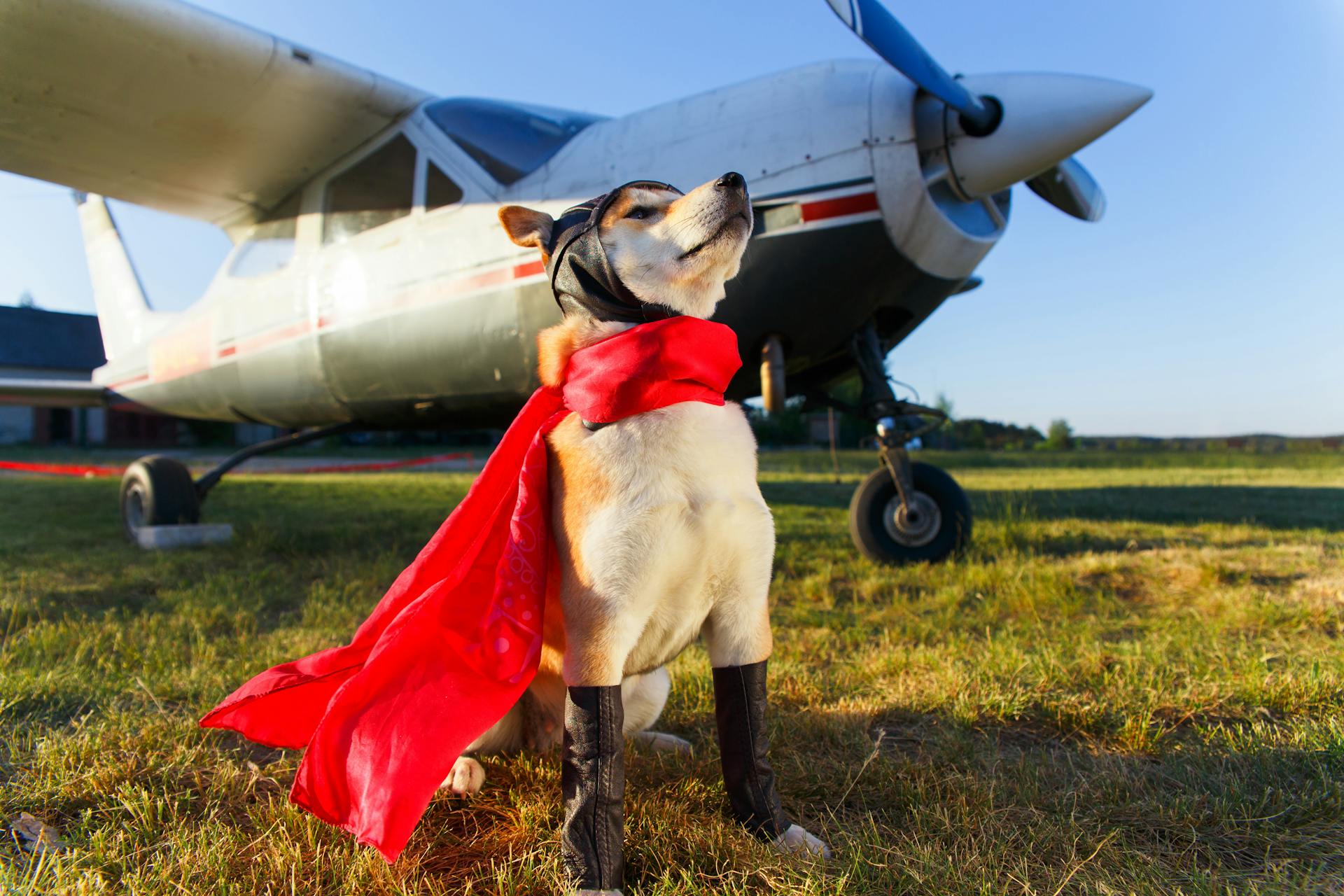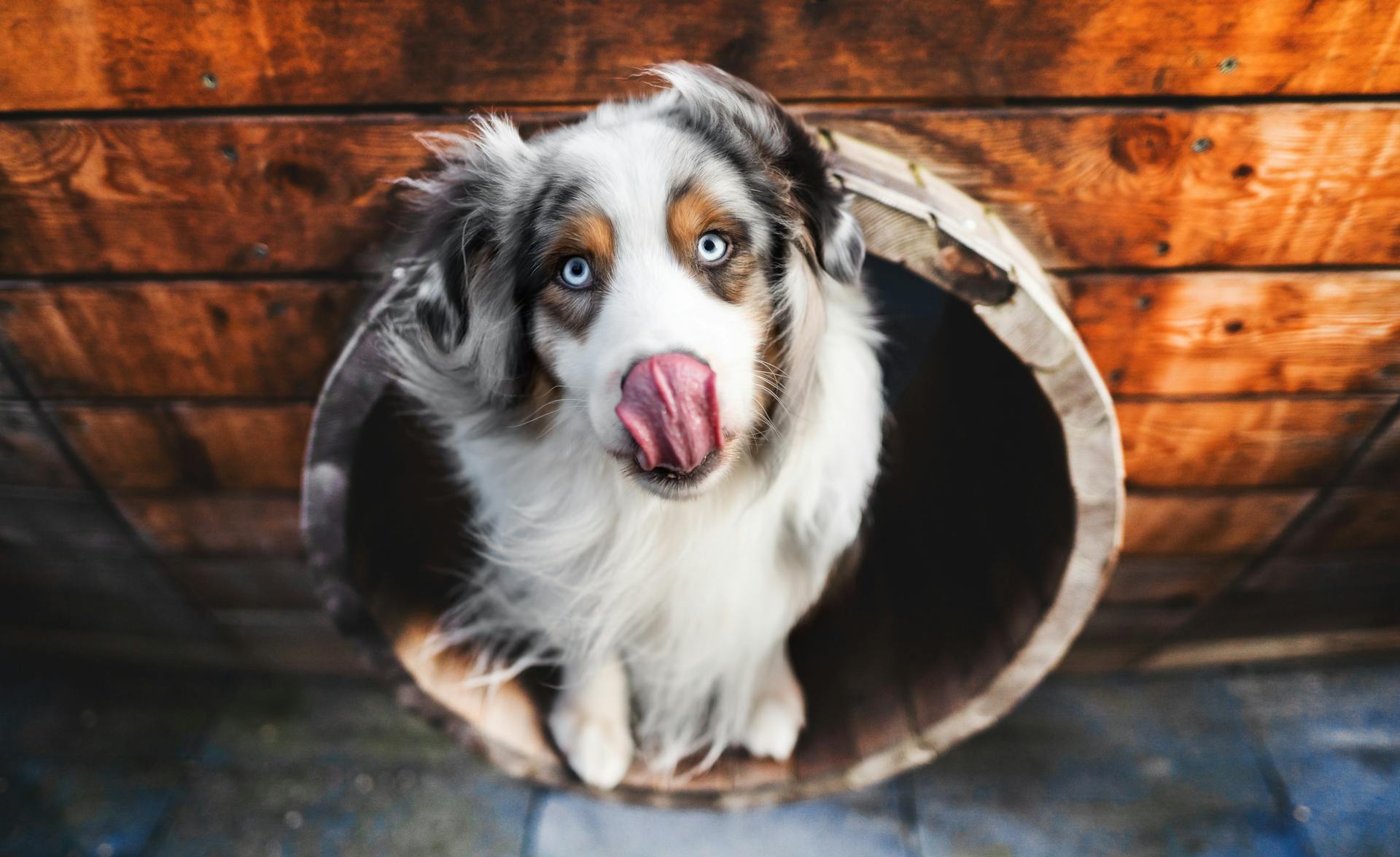
Airport security measures are in place to ensure the safety of travelers and prevent the transportation of illicit substances.
Trained drug dogs play a crucial role in detecting narcotics at airports.
These dogs are trained to sniff out specific scents and can detect even small amounts of drugs.
Their keen sense of smell allows them to locate contraband in luggage, on passengers, and in cargo.
Airport security personnel use various methods to screen passengers and luggage, including metal detectors and X-ray machines.
These measures help to identify potential threats and prevent them from entering the airport.
Take a look at this: How Are Drug Sniffing Dogs Trained
Airport Security Measures
Airport security is a top priority, and one of the most effective measures is the use of canine teams. These dogs are trained to detect explosives, drugs, guns, and even the Covid-19 virus.
At John F. Kennedy International Airport, the Transportation Security Administration (TSA) has several explosive detection canine teams working to enhance security. The canines and their handlers were trained at the TSA’s National Canine Training Center in San Antonio, Texas.
The dogs are trained for 12 weeks to detect explosives and explosive materials in a busy transportation environment. They sniff the air currents surrounding travelers and their belongings to detect anyone carrying explosives.
Canines are an important layer in airport security because they increase TSA’s explosive detection capability. They help with the efficiency and effectiveness of TSA’s screening operations.
Passengers departing JFK International Airport can expect to see the canine teams working around travelers. The teams navigate among large groups of people to pinpoint the source of an explosive odor, even if the source is mobile and unaware.
The canine handlers are trained to read their dog’s change of behavior when it indicates an explosive scent has been detected. If a dog alerts its handler, TSA follows an established procedure to resolve the alarm.
Explosives are the greatest threat to the aviation system, so the canines are regularly tested to ensure they maintain a high standard of operational effectiveness. This continual training allows the teams to be a reliable resource in detecting an explosive threat.
Airport Canine Units
Airport canine units are a vital part of security teams, with their advanced sense of smell capable of detecting drugs, guns, bombs, and even the Covid-19 virus.
These dogs are trained to sniff out explosives and explosive materials in busy transportation environments, like airports. They're an important layer in airport security, increasing the efficiency and effectiveness of screening operations.
Canines are used at John F. Kennedy International Airport (JFK), where they're trained to detect explosives and assist with passenger safety and security. They're even trained to navigate among large groups of people to pinpoint the source of an explosive odor.
Airport canine units are highly effective, with some dogs like Chiqui, a tiny Chihuahua, covering impressive ground while on the job. Chiqui was filmed by a passenger at a Colombian airport, where he was spotted with law enforcement officers and wearing a vest to match.
The use of these highly-trained canines is an effective tool in deterring and detecting the introduction of explosive devices into the nation's transportation systems.
Airport Screenings
Airport screenings can be a nerve-wracking experience, but drug sniffing dogs are there to help keep everyone safe.
These dogs work in conjunction with a handler, walking through security checkpoints and sniffing the air around passengers and their luggage.
Dogs are incredibly efficient, searching hundreds of bags in short order, and their passive role in security means most passengers won't be affected by their presence.
Drug detecting dogs are trained to find all sorts of narcotics, including marijuana, opium, cocaine, and heroin.
Operating covertly is crucial, as alerting a potential suspect or shooter puts countless lives at risk.
Their silence is key, as audible cues could tip off potential suspects, and they only give a silent cue when they identify a suspect, like sitting down next to a suspect's bag.
You might enjoy: Drug Sniffing Dog
TSA Canine Program
The TSA Canine Program is a vital component of airport security, with canine teams working at John F. Kennedy International Airport (JFK) to detect explosives and keep passengers safe.
For your interest: Airport Dog Sniffer
These highly trained canines and their handlers were trained at the TSA's National Canine Training Center in San Antonio, Texas, where the dogs learned to detect explosives and explosive materials in a busy transportation environment.
The canines are trained for 12 weeks to sniff out explosive odors in the air currents surrounding travelers and their belongings as they pass through the airport terminal.
The use of canine teams enhances security and allows TSA to stay ahead of threats by increasing their explosive detection capability.
Passengers departing JFK International Airport can expect to see the canine teams working around travelers, who are trained to read their dog's change of behavior when it indicates an explosive scent has been detected.
If a dog alerts its handler to the presence of explosive odor, TSA follows an established procedure to resolve the alarm, making the canines an effective tool in deterring and detecting the introduction of explosive devices.
The canines are regularly tested to ensure they maintain a high standard of operational effectiveness, allowing them to be a reliable resource in detecting an explosive threat in a busy transportation environment.
Airport News and Photos
Airport sniffer dogs are highly trained to detect a wide range of items, including explosives, drugs, and other illegal substances.
These dogs are often seen working alongside their handlers in airport terminals, searching for potential threats.
Some of the most common breeds used for this work are German Shepherds and Malinois dogs.
In the United States, sniffer dogs are employed by the United States Customs and Border Protection to inspect luggage and cargo arriving from abroad.
Airport sniffer dogs can be trained to detect specific scents, such as fruit, vegetables, and meat, as seen in a photo from the Houston Airport in 2012.
Airport Security Debunking
Dogs at airports are a crucial part of the security team, with their advanced sense of smell capable of detecting all sorts of dangerous substances.
Their incredible ability to sniff out drugs, guns, bombs, and even the Covid-19 virus makes them a valuable asset in keeping passengers safe and secure.
Canine teams are trained at the TSA's National Canine Training Center in San Antonio, Texas, where they learn to detect explosives and explosive materials in a busy transportation environment.
The dogs and their handlers are trained for 12 weeks, learning to navigate through crowds and detect explosive odors in the air currents surrounding travelers and their belongings.
The use of canine teams at airports is an important layer in security, increasing TSA's explosive detection capability and enhancing the efficiency and effectiveness of screening operations.
Canines are regularly tested to ensure they maintain a high standard of operational effectiveness, making them a reliable resource in detecting explosive threats and mitigating potential distractions.
Passengers departing JFK International Airport can expect to see canine teams working around travelers, expertly navigating large groups of people to pinpoint the source of an explosive odor.
If a dog alerts its handler to the presence of explosive odor, TSA follows an established procedure to resolve the alarm, making the use of these highly-trained canines an effective tool in deterring and detecting the introduction of explosive devices.
A unique perspective: Eliminating Dog Odor
Frequently Asked Questions
Can sniffer dogs smell drugs in your system?
Sniffer dogs can't detect drugs inside the human body, but they can detect the scent of drugs on a person's skin or in their luggage. Their training focuses on detecting odors on surfaces, not in bodily fluids.
Can sniffer dogs smell drugs inside you?
Sniffer dogs are unlikely to detect drugs inside your body, as they are typically odourless and not easily detectable. However, there are other methods that can be used to detect drugs in the body.
Do dogs sniffing for illegal substances at an airport require a warrant as long as what is being sniffed is in?
No warrant is required if the sniffing occurs in a public area, such as the baggage area, but a warrant is necessary if the substances are found in a private room or police custody
What do airport sniffer dogs detect?
Airport sniffer dogs detect narcotics, explosives, and firearms to ensure public safety. Their keen sense of smell helps identify potential threats at airports.
What drugs do sniffer dogs detect?
Sniffer dogs are trained to detect a range of illicit substances, including marijuana, heroin, cocaine, crystal meth, fentanyl, MDMA, and various types of opioids and opiates. These highly skilled canines play a crucial role in law enforcement efforts to combat substance abuse and trafficking.
Sources
- https://www.utahcriminallaw.net/what-happens-drug-dog-catches-you-slc-airport/
- https://www.istockphoto.com/photos/airport-sniffer-dog
- https://www.ladbible.com/news/tiny-drug-dog-sniffing-out-naughty-stuff-20220318
- https://www.3dk9detection.com/news/dogs-at-airports-5-types-of-screening-where-dogs-are-used
- https://www.tsa.gov/news/press/releases/2023/09/20/tsa-canines-enhancing-security-john-f-kennedy-international-airport
Featured Images: pexels.com


